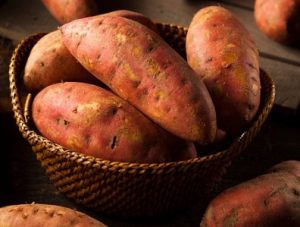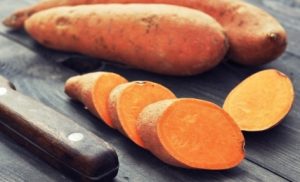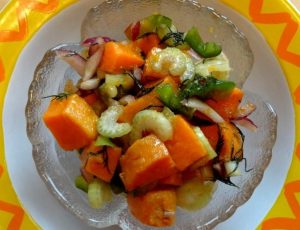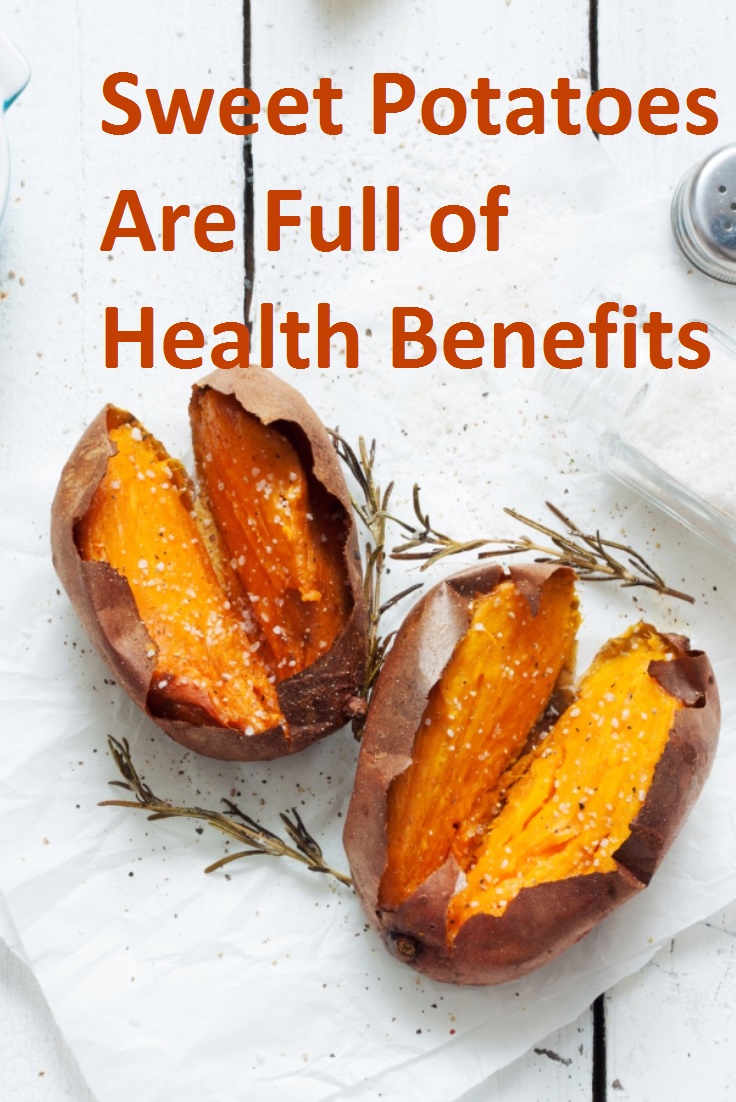You can mash them or bake them, or give them a quick fry, sweet potatoes are delicious and full of health benefits too! This starchy superstar is a delicious treat and has become a sentimental staple at Thanksgiving dinners. The good news is that they are actually very nutritious as well as being exceptionally delicious.
Read on to discover their health benefits, their history and trivia, and tips for cooking them just right.
Don’t let the ‘sweet’ in a sweet potato scare you.
They actually have a lower glycemic index than white potatoes. That means they are less likely to produce insulin resistance and its accompanying health problems, including weight gain. They are a smart carb, very rich in carotenoids, vitamins A, B6, C, potassium, iron and fiber. They provide a wealth of health benefits and are a great addition to your meals.
Did you know that the sweet potato was cultivated and consumed before the white (Irish) potato?
13 Health Benefits of Sweet Potatoes
1. Maintains Healthy Blood Sugar Levels
Yes, they are sweet, but they have a low glycemic index meaning the sugar is released slowly into the bloodstream. Most consumed starchy foods raise blood sugar rapidly; with sweet potato, you will not get a blood sugar spike, but you will get a steady amount of energy. Research at the College of Agriculture and Life Sciences found the Beauregard sweet potato to be a low-glycemic index food.
2. Treatment for Diabetes
A study of 61 people with type 2 diabetes saw that those who took the extract, Caiapo, from the sweet potato daily for 3 months had their blood sugar drop with no significant adverse effects.
Caiapo has been used without medical prescription for years in Japan as a food additive for prevention and treatment for diabetes.
“We’re hoping that diet, particularly the consumption of sweet potatoes, will become a more widely used tool in the treatment of diabetes. It has the potential to be more cost-effective than drugs.” – Dr. Jon Allen, CALS professor of food science.
3. Immune System is Strengthened
They are high in vitamin C, Beta Carotene and vitamin E that support a healthy immune system and are powerful disease-fighting antioxidants.

4. Helps Keep the Heart Healthy
They are a great source of B6 vitamins, which break down homocysteine, a substance that contributes to the hardening of blood vessels and arteries. – Harvard University School of Public Health.
Also, being a good source of potassium, they help the heart by lowering blood pressure according to the American Heart Association. Potassium is also an important electrolyte that helps regulate your heartbeat.
5. Reduce the Chances of Stomach Ulcers
Functional Foods in Health and Disease did a study in 2012 on how effective then sweet potato was in healing an ulcer. The sweet potato had a potent ulcer healing effect!
6. Good for Weight Loss
They are a good source of dietary fiber, which slows down digestion so you eat less. This also helps with regular bowel movements.
7. Anti-Inflammatory Effects of Purple Sweet Potato
A study found the extract of the purple sweet potato to be anti-inflammatory.
A Sweet Potato is High in Beta-Carotene (Vitamin A)
1 cup Sweet potato, cooked, baked in skin = 769 percent daily recommended intake of Vitamin A, according to the U.S. Food and Drug Administration.
Vitamin A is an antioxidant that protects cells from damage caused by free radicals believed to contribute to some chronic diseases.
According to the U.S. National Library of Medicine, Beta-Carotene also Helps with the Following:
8. Creates Healthy Skin, Hair, Teeth and Bones
9. Promotes Good Vision because it produces the pigments in the retina of the eye.
10. Helps with Anti-aging
11. Cancer Prevention. It is best for the beta-carotene to come from real food as the supplements don’t seem to reduce cancer risk. Beta-carotene may reduce the risk of breast cancer and ovarian cancer.
12. Decreases Asthma Symptoms Caused by Exercise.
13. May Help Protect Against Sun Damage, according to a 2004 study in the Medical Journal.
Please Note: Possible Side Effects

When eaten in moderation and prepared in a healthy way (not just indulging in sweet potato fries), they are nutritious, without significant health risks. They are high in carbohydrates, 1 cup of cooked sweet potato has 180 calories and for comparison, one cup of cooked broccoli has about only 55 calories.
They have a moderate to high amounts of oxalates which may increase the risk of oxalate-crystal kidney and gall stones. For most of us this is not a problem if we have a healthy kidney and gall bladder. Read: How to Prevent Kidney Stones
Nutrition
- They are more nourishing than potatoes and many grains with their higher nutrient values.
- The leaves of the sweet potato plant are full of protein, with a high amino acid score.
- They have over 750 percent of your daily needs for vitamin A in 1 cup of cooked sweet potato, according to the U.S. Food and Drug Administration.
Sweet Potato Trivia

- They were eaten as aphrodisiacs in Europe, likely because they were a delicacy.
- Latin America Indians make a red dye from the mixed juices of limes and sweet potato.
- In Japan’s mountainous region, Kagawa, the white sweet potato is eaten raw has long been a traditional treatment for anemia, hypertension and diabetes.
- George Washington Carver developed glue for postage stamps, wood fillers, more than 73 dyes, rope, breakfast cereal, synthetic silk, shoe polish and molasses. He wrote several brochures on the nutritional value of the sweet potato.
- North Carolina produces about 40 percent of the U.S. supply.
- They are roots, not tubers like regular potatoes.
- A sweet potato festival called Tater Day Festival is held in Benton, Kentucky on the first Monday of April, annually.
Sweet Potato History
- They have been grown in Central and South America for at least 10,000 years by the Inca and Aztecs. Sweet potato samples have been found in the Neolithic Period and perhaps to the end of the last Ice Age, or 8000 B.C. in Peru according to the National Potato Center.
- Christopher Columbus took the sweet potato to Spain after his first voyage in 1492 introducing them to the gardens of Europe.
- History mystery: Polynesians were growing them as early as 1200 A.D.
- Spanish explorers are said to have taken the sweet potato to the Philippines and East Indies. Then they made their way to India, China and Malaya by Portuguese voyagers in the late 16th century and the 17th and 18th centuries.
- They were grown in Virginia in 1648 and perhaps earlier, and they were taken to New England in 1764.
And now we know where our beloved sweet potato pie comes from!
Tips For Eating and Cooking Sweet Potatoes to Get All the Health Benefits

They have a very high amount of beta carotene which gives us many health benefits (healthy skin, hair, teeth, bones, vision, plus helps with anti-aging, cancer prevention, decreases asthma symptoms and protection against sun damage).
How do we get the most beta carotene from a sweet potato?
It is best to cook them to get the most beta carotene, but not all methods are equal.
To confuse the issue, raw sweet potatoes contain the most beta carotene (see this chart at the U.S. National Library of Medicine).
So why not just eat a raw sweet potato?
The problem is that they have an enzyme inhibitor that stops the trypsin enzyme in your body from digesting proteins. This protein inhibitor is broken down in the cooking process; heating to 194 degrees Fahrenheit for several minutes inactivates trypsin inhibitors.
A raw sweet potato can make you fart!
They contain a sugar called raffinose; it is one of three plant sugars that are unable to be digested in the stomach. They get broken down in the intestines, making hydrogen and CO2 which makes gas. Raffinose is decreased by cooking in the same way raffinose is decreased in beans by cooking according to a Michigan State University study.
Which Cooking Method Makes Available The Most Health Benefits of Beta-carotene?
According to research sited at the U.S. National Library of Medicine, this is the amount of beta carotene left after the following processes:
• Oven-drying process: 89–96 percent
• Boiling: 84–90 percent
• Frying method: 72–86 percent
• Sun-drying process: 63–73 percent
Ok, let’s get cooking.
Get the Health Benefits of Sweet Potatoes with Tasty Recipes

100+ Superfoods
Learn more about some of the healthiest vegetarian foods you will always want to have in your pantry or growing on your deck.READ: Superfoods – Over 100 of the Healthiest Foods You Should Have in Your Diet and learn more about the variety of Superfoods we think you should have in your diet.



Our two girls are grown now with a tiny one each of their own. Can’t wait to start cooking with the next generation!
This looks amazing and fairly simple to do. I have never made stuffed anything but these look simple enough to try sometime. I love how you made garlic zucchini noodles to go with the dish. That’s my favorite way to eat zucchini noodles. I use my spiralizer weekly. Definitely one of the best birthday gifts I have received.
I’m a teenager who is absolutly in love with cooking, and I saw this on your youtube channel one day and I decided to make it for my parents. I really like the info you share, it’s really helpful. The reaction of my parents when they tasted the spagetti squash was so amazing. thank you for sharing this kind of info with all of us.
Can’t wait to start cooking with the next generation!
hanks! My fiancé is an amazing cook but me, not so much! I made this today for dinner so he didn’t have to cook. It was great! Easy enough for this inexperienced cook and tasty enough for his experienced taste buds! I added A super reduced balasmic on top since we use it for Caprese salad and it baked onto The chicken really well. This recipe is a keeper! Any idea for a balsamic Like sauce to go with it?
Made this tonight, hubby already asking for it again, fabulous and so simple, thank you for the recipe!!!! I am still full!!
Great article . Extremely helpful .
They were grown in Virginia in 1648 and perhaps earlier, and they were taken to New England in 1764.
Amazing, Scrumptious, very healthy and easy recipe about sweet potatoes..I do enjoy reading your very rich and precious ""LECTURES" about food and very healthy life..Many Thanks..Zouhair
Second time I have tried this dish – absolutely delicious! Thanks ever so much for this.
Paul, which recipe did you make?